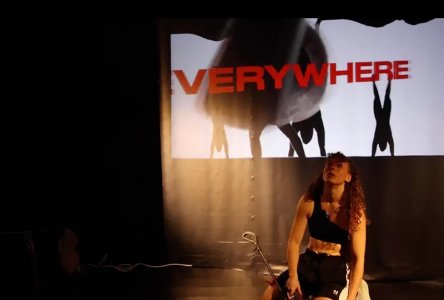
HEDDA GABLER (2024)
HEDDA GABLER, Secret House in association with bAKEHOUSE Theatre at KXT Broadway, 18 October-2 November 2024. Photography: Braiden Toko - above Ella Prince and James Smithers; below - Prince, Smithers and Jack Angwin; below again - Jane Angharad
In his adaptation of Henrik Ibsen’s Hedda Gabler, director Anthony Skuse has done away with Berte, the maid who attends to Hedda’s every wish. Instead, composer and sound designer Christie Mae not only calls the acts, Brecht-style but plays her soundtrack live from the upright piano that, late in the piece, Hedda crashingly abuses in a fit of rage. It’s an effective use of props and personnel in an electrifyingly effective production.
Skuse has similarly avoided the cliches of Aussie idiom that often pass for updating classics and has stripped back the original 150+ minutes to 90 minutes of taut, revealing characterisations. These begin with Hedda herself who, in the person of Ella Prince, is a disconcerting presence from the outset.
Prince is an actor who doesn’t set out to be loved, rather she goes full tilt for the truth. In this instance, it is that Hedda is a bit of a shit and always has been. There is no attempt to sugar-coat or provide 21st-century motivations. Instead, the greater truth is laid bare: Hedda is not merely a woman struggling in a 19th-century man’s world, she is also a selfish and ambitious one. It means endless frustration and little alternative but to engineer a marriage that will provide her with the creature comforts she deems necessary.
The play opens with Hedda’s return from a six-month (!) European honeymoon with Tesman (James Smithers). He’s an academic who takes himself extremely seriously and she is already almost insane from the tedium of his company. Come to greet them in rapid succession are Tesman’s aunt and surrogate mother Julianna (Suzann James); Thea (Jane Angharad), an old school friend of Hedda’s, and Judge Brack (Christopher Tomkinson), local luminary and roué.

However, before even arriving in the room, Lovborg (Jack Angwin) is the catalyst for turmoil as Thea tells of her success in weaning him off alcohol and his success with a book whose topic is alarmingly similar to Tesman’s own work. It also becomes apparent that the professorship Tesman has been relying on to keep his bride in the style to which she is accustomed is now up for grabs. And Lovborg is in the running.
Such are the subtleties of the original script – intact and astutely employed by director and company – that the hints of Tesman’s early devotion to Hedda (the extravagant purchase of a house after she mentioned in passing that she liked it) and emotional undercurrents are there for the audience’s taking. The intensity of the interpretation is riveting and sustained throughout.
On opening night the traverse stage tangibly crackled with Hedda’s pent-up rage and disdain (doting Aunty is not her favourite, and vice versa). However, she’s reduced to gurning when she leaves herself with nowhere else to go by opening at full tilt. Dialling it back a notch at the outset would make a powerful performance simply unforgettable.
The circulating eddies of the other cast members are equally effective and none escape into niceness: humanity is present, warts and flaws and all in each. They collectively underline why the play – seemingly so bleak – withstands time and passing fashion to fascinate and enthral new generations.

As for the production’s nuts and bolts, well as playing the deceptively adoring husband, James Smithers is also the set designer. The Tesman-Gabler parlour is austerely realised with long wall mirrors, dark wood panelling and sliding doors to the rest of the house. Travis Kecek’s lighting is apt for the period while also managing the constraints of having audience along either side of the stage.
There are guns, of course, and Hedda’s matter-of-fact playfulness in not quite winging Brack is a highlight among many compelling moments. Anthony Skuse has long been regarded in Sydney theatre as one of our finest directors, With his recent brilliant reworking of The Cherry Orchard (Old Fitz) it yet again raises the question of why he’s consistently ignored by the mainstream. Meanwhile, independent theatre is the richer for it. Recommended without reservation.
Comments
Leave a Comment
Enter your username and password to comment. Don't have a username? Register now.

-c444x300.jpeg)


Be the first to leave a comment below